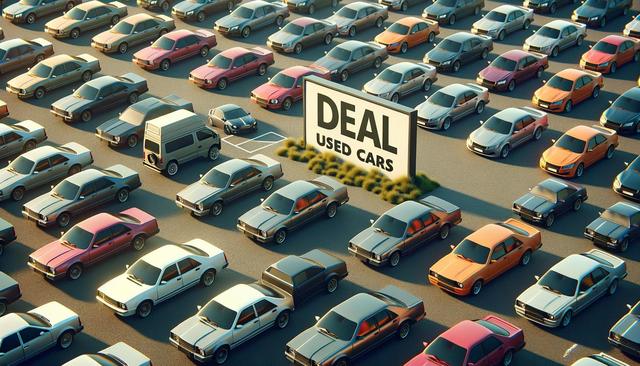
Smart Strategies for Finding Great Used Car Deals
Why Consider a Used Car?
Choosing a used car instead of a new one offers several financial and practical benefits. New cars begin to depreciate the moment they leave the dealership—often losing up to 20% of their value in the first year alone. With used vehicles, that initial depreciation is already accounted for, which means buyers get more value for their money. Additionally, many used cars on the market today come with updated features, modern safety technologies, and low mileage, making them a sensible choice for many drivers.
Another advantage is reduced insurance costs. Since used cars typically have a lower market value, insurance premiums are often more affordable compared to those for brand-new models. Vehicle registration fees can also be lower for older cars, depending on your local regulations. These savings add up over time and contribute to the overall appeal of used car ownership.
Lastly, the used car market is vast, offering a wide range of makes, models, and price points. Whether you’re looking for a compact car for city driving or a family-friendly SUV, there’s likely a used option that fits both your needs and budget.
Where to Find Used Car Deals
There are multiple avenues for discovering used car deals, each with its own advantages. Dealerships often maintain certified pre-owned (CPO) programs that include thorough inspections and limited warranties, offering peace of mind for buyers. These vehicles tend to be newer and come with added service benefits, although they may be priced slightly higher than non-certified options.
Online platforms have revolutionized the way buyers shop for used cars. Websites and mobile apps allow users to filter by price, location, mileage, and more, making it easier to find vehicles that meet specific criteria. Some platforms even offer home delivery or at-home test drives, adding extra convenience to the process.
Private sellers can also be a great source for deals. Buyers may be able to negotiate lower prices directly with owners, but it’s essential to conduct thorough inspections and verify the car’s history. Some popular places to look include:
- Local classifieds
- Online marketplaces
- Car auctions (in-person or online)
- Word of mouth or community boards
What to Look for in a Used Car
When evaluating used cars, there are several key factors to keep in mind to ensure a smart purchase. Begin by researching the specific make and model you’re interested in. Look into its reliability ratings, fuel efficiency, and common repair issues. Understanding the long-term ownership costs can help avoid unpleasant surprises down the road.
Always request a vehicle history report. This document will reveal important details such as previous accidents, title status, service history, and any instances of flood or fire damage. A clean history report can strongly support a car’s value, while red flags may warrant reconsideration or further investigation.
A physical inspection is also crucial. If possible, bring a trusted mechanic to assess the car’s condition. Look for signs of wear and tear, check fluid levels, and take the vehicle for a test drive. Pay attention to how it handles, brakes, and accelerates. Key elements to evaluate include:
- Engine performance
- Transmission responsiveness
- Brake and tire condition
- Interior cleanliness and functionality
Financing and Negotiating Tips
Financing a used car can be different from financing a new one, but there are still plenty of options. Start by checking your credit score and securing pre-approval from a bank or credit union. This gives you a clear idea of your budget and allows you to negotiate better terms with sellers or dealerships.
When it comes to negotiation, preparation is key. Research the market value of the car using resources that track average selling prices for similar models in your area. Be ready to present your findings and don’t hesitate to walk away if the deal doesn’t meet your expectations. Sellers are often willing to lower their asking price, especially if the car has been listed for a long time or has minor cosmetic flaws.
It’s also worth considering additional costs such as taxes, registration fees, and any immediate repairs the car might need. Including these in your budget can help avoid overspending. If buying from a dealership, review any financing offers carefully, including interest rates and loan duration. Shorter loans may come with higher monthly payments but can save money on interest over time.
Protecting Your Investment
Once you’ve secured a used car deal, taking steps to maintain and protect your vehicle will help extend its lifespan and preserve its value. Regular maintenance—like oil changes, tire rotations, and brake checks—can prevent costly repairs and improve overall performance. Following the manufacturer’s recommended service schedule is a good practice.
Keeping records of all maintenance and repair work can also be beneficial, especially if you plan to resell the car later. These documents serve as proof of upkeep and can make your vehicle more appealing to potential buyers. Additionally, consider investing in accessories such as floor mats, seat covers, and sunshades to keep the interior in good shape.
For added protection, some buyers opt for extended warranties or service contracts. These can cover certain repairs beyond the original warranty period, offering extra peace of mind. However, it’s important to read the terms carefully and assess whether the coverage justifies the cost. Ultimately, being proactive about care and maintenance is the most effective way to get the most out of your used car.
Conclusion: Making the Most of Used Car Deals
Shopping for a used car can be a rewarding experience when done with careful planning and research. With a wide selection of vehicles, budget-friendly pricing, and the right strategies, it’s possible to find a reliable car that fits your needs without overspending. By focusing on vehicle condition, verifying history, and understanding financing options, buyers can make informed decisions that lead to long-term satisfaction. Whether you’re a first-time buyer or simply looking to save money, exploring the used car market offers practical benefits worth considering.